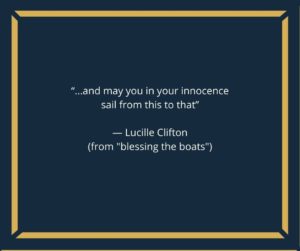Lucille Clifton (1936-2010) was a prolific poet whose work garnered well-deserved praise and awards over the course of many decades. Clifton’s poetry and children’s books explored the African-American experience in the United States, often focusing on themes of endurance, strength, and adversity.
Clifton was the Poet Laureate of my home state of Maryland from 1974-1985, the first African American and only the second woman to hold that position. I first read her poetry in the early 2000s when I attended St. Mary’s College of Maryland, where Clifton was a Distinguished Professor of Humanities in the late 1980s and 1990s. Although she was no longer teaching at the college during my time there, she regularly came back to speak to students and read her new and famous works. I had the pleasure of attending one of her lectures, perhaps the first time I heard an author read her own work. Clifton was mesmerizing; confident, generous, radiating warmth and strength.
St. Mary’s College is a beautiful, rural campus situated on the St. Mary’s River just before it feeds into the Potomac and flows into the Chesapeake Bay. The college is located in St. Mary’s City, the first English Catholic settlement in North America and the first place in America that an Englishwoman (Margaret Brent) requested the right to vote. One of Clifton’s most famous poems, Blessing the Boats, instantly transports me “home” to my beloved alma mater and the longstanding Catholic tradition of blessing the fleet that resonates with the history of St. Mary’s City. In fact, this poem is so closely associated with the identity of St. Mary’s and its students that it adorns the entry to the dining hall. It is simultaneously calming, affirming, and energizing, beautiful in its simplicity, but challenging in its call to faith and action. This lovely, flowing poem feels like the gentle encouragement of a beloved friend who will always remind you that you can do hard things and emerge stronger after you “sail through this to that.”



